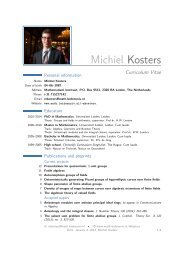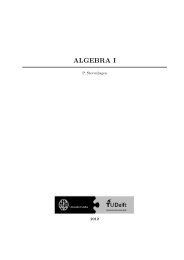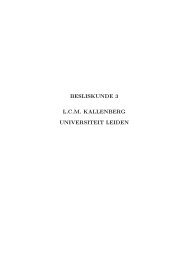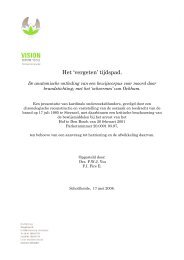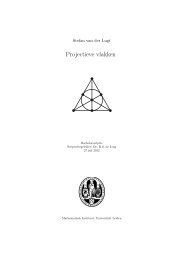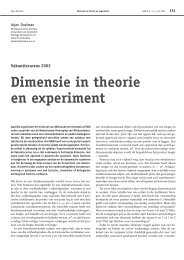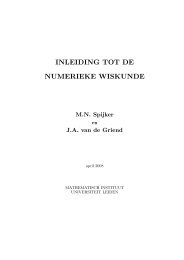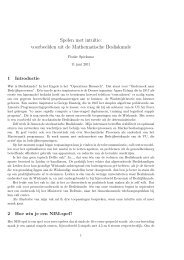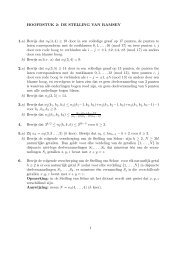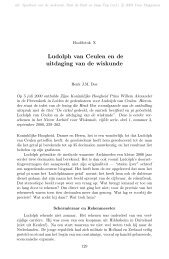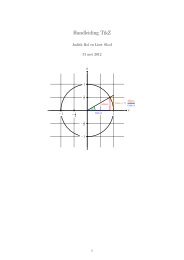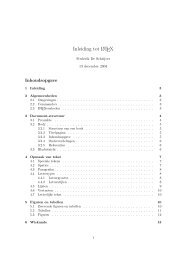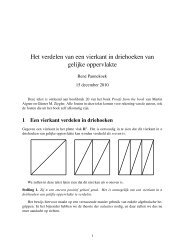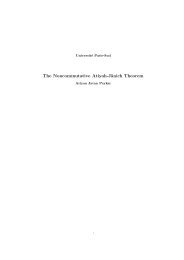The Inspiration of John van de Geer
The Inspiration of John van de Geer
The Inspiration of John van de Geer
You also want an ePaper? Increase the reach of your titles
YUMPU automatically turns print PDFs into web optimized ePapers that Google loves.
STATISTICS MEETS PSYCHOLOGY<br />
<strong>The</strong> <strong>Inspiration</strong> <strong>of</strong> <strong>John</strong> <strong>van</strong> <strong>de</strong> <strong>Geer</strong><br />
Willem Heiser<br />
Institute <strong>of</strong> Psychology<br />
Lei<strong>de</strong>n University<br />
20/08/2009 1
Fortuna & Sapientia:<br />
Old i<strong>de</strong>a <strong>of</strong><br />
Chance and Knowledge<br />
in opposition<br />
(source: Petrarca, ed. 1524)<br />
Statistics:<br />
Chance processes are<br />
a resource for the scientist,<br />
to distinguish random<br />
from systematic variability<br />
20/08/2009 2
C:<br />
A:<br />
Paradigm Shifts in Psychology<br />
Nature + Nurture<br />
→<br />
Retrospective explanations: Correlational method<br />
Black<br />
B: Stimulus → Box → Response<br />
Behaviorism: Simple experiments (<strong>of</strong>ten without statistics)<br />
Stimulus<br />
Variability<br />
Cognitive and<br />
→ Motivational →<br />
processes<br />
Variability <strong>of</strong><br />
Mind and Behavior<br />
Response<br />
Variability<br />
“Cognitive Revolution”: Complex Designs<br />
20/08/2009 3
<strong>John</strong> <strong>van</strong> <strong>de</strong> <strong>Geer</strong><br />
(1926‐2008)<br />
Wrote the first Annual Review paper<br />
about the emerging cognitive revolution (upon invitation)<br />
Annual Review <strong>of</strong> Psychology, 17 (1966), 145‐176<br />
20/08/2009 4
Career<br />
1947: started study Psychology in Lei<strong>de</strong>n (pr<strong>of</strong>essor Chorus 1 st chair)<br />
1949: teaching assistant in statistics, learning, perception & thinking<br />
1957: Ph.D. “A Psychological Study <strong>of</strong> Problem Solving”<br />
1963: chair in experimental psychology and statistics<br />
1970: chair in data theory & mathematical psychology<br />
1987: retired<br />
Some Additional Affiliations:<br />
• Institute for Perception TNO Soesterberg<br />
(1960‐1970)<br />
• Shelter Home for Female Juveniles<br />
(1953‐1963)<br />
• Center for Ad<strong>van</strong>ced Study in the<br />
Behavioral Sciences, Stanford (1968)<br />
20/08/2009 5
Work<br />
Apart form a wi<strong>de</strong> range <strong>of</strong> papers in many areas <strong>of</strong> psychology,<br />
<strong>John</strong> <strong>van</strong> <strong>de</strong> <strong>Geer</strong> wrote four books:<br />
� De Mening <strong>van</strong> <strong>de</strong> Psycholoog, 1961.<br />
� Inleiding in <strong>de</strong> Multivariate Analyse, 1967.<br />
� Introduction to Multivariate Analysis for the Social Sciences, 1971.<br />
� Multivariate Analysis <strong>of</strong> Categorical Data, 1993.<br />
and was co‐author <strong>of</strong> Albert Gifi, Nonlinear Multivariate Analysis, 1990.<br />
20/08/2009 6
<strong>John</strong>’s I<strong>de</strong>as About Consulting and Teaching<br />
a) Discovery goes by trial and error: the hypothetical‐<strong>de</strong>ductive<br />
process that scientists use to learn about nature is also valid in<br />
applied psychology, psychological counseling and consultation;<br />
b) Learning must be contextualized: instruction is more efficient if<br />
interactive and personalized—Van <strong>de</strong> <strong>Geer</strong> started programmed<br />
instruction for teaching statistics to psychology stu<strong>de</strong>nts;<br />
c) Formalization helps: <strong>of</strong>ten many names exist for the same<br />
concepts and methods → switch to the language <strong>of</strong> mathematics;<br />
d) Cross‐fertilization: what we have learned to use in one context<br />
(e.g., psychology) should have good application in other<br />
contexts as well (e.g., political science).<br />
Same for biology ↔ psychology, …<br />
20/08/2009 7
Conclusions<br />
1. <strong>John</strong> <strong>van</strong> <strong>de</strong> <strong>Geer</strong> influenced all major experimental psychologists<br />
in the Netherlands by his critical way <strong>of</strong> thinking and strong<br />
methodological skills.<br />
2. He also influenced a whole generation <strong>of</strong> quantitative<br />
psychologists (home and abroad) by his analytical mind and<br />
strong sense <strong>of</strong> synthesis.<br />
3. After founding <strong>of</strong> the Department <strong>of</strong> Data <strong>The</strong>ory, he thought that<br />
the natural next goal was to set up a cooperative effort joining<br />
behavioral and social statistics with biostatistics, mathematical<br />
statistics, agricultural statistics, and more.<br />
4. As all godfathers, he always was ahead <strong>of</strong> his time…<br />
20/08/2009 8



